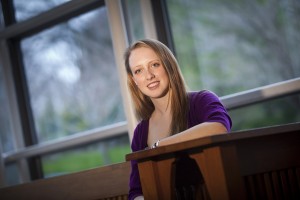
Tracy McFarlan ’13
By Michele Tallarita ’12
Aside from some viola lessons in middle school, Tracy McFarlan ’13 (Yardley, Pa.) hasn’t had much experience with music—but that hasn’t stopped her from racking up achievements in music research.
This summer, McFarlan, a history major, worked with Jorge Torres, associate professor of music, on his upcoming book, The Greenwood Encyclopedia of Latin American Popular Music, a 200,000-word volume that will hit the presses sometime this year.
“Latin American popular music was something I knew nothing about going into this summer,” says McFarlan, “so what I enjoy most about this project is the exposure I am getting to a new field.”
McFarlan worked under Torres as an EXCEL Scholar, making edits to entries in the encyclopedia, managing information about its contributors, and even using her skills as a chronologist to contribute a few entries herself.
“There’s actually a lot of crossover between history and the arts,” she says. “The underlying historical environment helps to make sense of why artistic movements happened when they did, why styles caught on, what kinds of art appealed to the people. The great part about Lafayette is that it not only recognizes that all fields are inherently interdisciplinary, but emphasizes it as you take classes both within and outside of your major.”
This wasn’t the first time McFarlan put her efforts toward a project with a musical bent. Last fall, she presented a paper at the College Music Society national conference, a three-day meeting in which performers, composers, musicologists, and music educators present on a wide range of topics from all musical disciplines. Most speakers are graduate students or faculty; it is very rare that a second-year undergraduate is invited to read a paper, especially one who applied as a first-year student.
The paper, “Identity Crisis: Music, Art and Literature from 1900 to 1914,” was derived from her final project in her First-Year Seminar, taught by Kirk O’Riordan, assistant professor of music, who also supervised her preparation for the conference.
She was inspired to write the paper, she says, when she noticed connections between artistic movements of the time period, like abstract art, futurism, and isolationism, with trends in society, like women’s rights, industrialization, and urbanization. The topic made use of both her musical interests and her penchant for history.
McFarlan is thinking about continuing her historical studies in graduate school. In the meantime, she makes a point of bridging the gap not only between music and history, but also between Lafayette and Easton. She works for the Landis Community Outreach Center coordinating service projects and was the co-chair for Lafapalooza: Lafayette’s Annual Day of Service this spring. She’s also a member of the Alpha Gamma Delta sorority and will study abroad in France this year.
